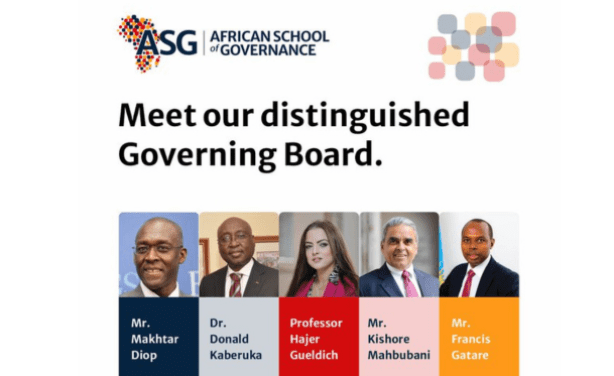The African School of Governance (ASG) in Kigali is at an early turning point. When Professor Kingsley Moghalu stepped down as Vice-Chancellor last week, he cited “challenges regarding corporate governance, and institutional and academic independence” after just nine months in the role.
In a post on X, Moghalu claimed he had been “toiling” for nine months and listed several “achievements”. For its part, ASG’s statement regarding his departure emphasised “humility”, suggesting, among other things, a difference in values. Far from a setback, this moment is a golden opportunity for ASG to sharpen its mission to inspire a new generation of African leaders. For a continent brimming with potential, this could be the spark that lights up the future.
A Values Mismatch?
ASG’s governing board is a dream team of African and global talent. The school’s mission is to train purpose-driven leaders who can tackle Africa’s challenges with solutions rooted in the continent’s history, values, and realities. Its flagship Master’s in Public Administration (MPA), alongside plans for an Executive MPA and specialised courses, aims to graduate 1,000 leaders in five years.
Moghalu listed two achievements.
The first was to lead an “ASG President’s Africa Tour”, visiting six countries and meeting over 60 leaders—ministers, diplomats, and business tycoons—to put ASG on the continental map.
Clearly, this was important for a new institution, particularly one aiming to do something unique. The ASG seeks to provide an education unlike any other— a truly African education that addresses the shortcomings of existing higher education programmes.
Yet ASG’s emphasis on “humility” in its response to Moghalu’s exit hints at a mismatch. His high-profile approach may have felt like the spotlight was on him rather than the institution. For a school built on fostering selfless, servant-hearted leaders, it is only sensible that the focus remains on the collective goal. If a values mismatch was indeed the issue, as I suspect, then dexterity will be essential in appointing a successor. The board, with its deep expertise, is well-positioned to choose a new leader who can amplify ASG’s vision while keeping the institution front and centre.
Focus On Youth, Youth, Youth
The second achievement was to launch “with great success”, as Moghalu put it, a standout executive education programme, Transforming Countries: Becoming the Leader Your Country Needs(8–10 July 2025), drawing 20 luminaries, from former prime ministers to chief justices, across 15 African countries.
Again, in the tradition of humility, the greatness of the success ought to be determined by others rather than through self-assessment. More substantively, however, the school’s credibility depends on training leaders for Africa’s future, not celebrating its past. Moghalu’s executive programme, while notable, leaned on retired or semi-retired elites. That’s great for buzz, but ASG’s success will come from shaping the next generation, not hosting VIPs. If the school becomes a prestigious pitstop for big names, it risks underperforming as a force for transformation.
One layer of the school’s mission is to mould leaders who will steer Africa towards 2050—people with 20–30 years of impact ahead. That means targeting public servants, policymakers, and scholars aged 35–45, individuals with enough real-world experience to bring insights to the classroom but young enough to embrace fresh ideas. A former prime minister might add glamour, but they’re often set in their ways. Those seasoned veterans would be ideal as instructors or mentors, sharing their wisdom, not filling student seats.
This focus on youth is crucial. Africa’s population is the youngest in the world, with over 60% under 25. ASG’s students need to connect with this generation, understanding their dreams, frustrations, and digital-first worldview. By training mid-career leaders with decades of influence ahead, ASG can build a pipeline of visionaries who will shape the continent’s future for decades to come.
Colonial Education Burden
ASG’s other major opportunity lies in its chance to rethink African education. For too long, Africa has been stuck in a colonial rut, producing technocrats who excel at running systems but struggle to reimagine them. Since the 1980s, when Structural Adjustment Programmes prioritised efficiency above all, Africa has produced leaders who can crunch numbers but miss the heartbeat of their people.
These “technocrats,” often shaped by colonial-style education, are adept at administration but too frequently blind to sociology, geopolitics, or cultural currents. Picture a finance minister who can predict inflation but not the unrest brewing in the streets over her anti-inflation policies. Or a foreign minister who knows the G20 inside out, but not their own region’s dynamics, and therefore unable to alert their government to the possibility that a neighbour might be swept up in a crisis. This is the technocratic trap, and it has held Africa back. ASG can change that by training leaders who blend technical skills with civic imagination, moral courage, and geopolitical savvy. Leaders who don’t just react to global shifts but anticipate them. A curriculum rich in African history, social sciences, and real-world case studies could make ASG a beacon of hope, moving beyond the cold, detached models of the past.
Administration Vs Policy
This raises a question: why is ASG offering a Master’s in Public Administration instead of Public Policy? Public Administration focuses on mechanics—managing people, budgets, and processes. It’s vital, but it’s only part of the picture. Public Policy is about big ideas: designing strategies to tackle poverty, climate change, or regional integration. It’s about asking what policies will transform lives, not just how to implement them. Public Administration feels tied to the technocratic era, focused on efficiency within existing systems. But Africa needs leaders who can rethink those systems, not just manage them.
A Public Policy programme would push students to question assumptions, weigh trade-offs, and craft solutions that reflect Africa’s realities. By pivoting to Public Policy, ASG could spark the mindset shift it promises, blending global standards with African knowledge to produce leaders who don’t just run the machine but redesign it for a better future.
Against this backdrop, Moghalu’s departure is a gift. For him, it’s a chance to reflect and find new ways to contribute to Africa’s rise. For ASG, it’s an opportunity to reach greater heights. With a stellar board, the school has the foundation to make history. The next steps are clear: choose a leader who prioritises ASG’s mission, focus on mid-career professionals with decades of impact ahead, and build a curriculum that breaks the technocratic mould with Public Policy at its core.
ASG shouldn’t be just a school but a movement to redefine African leadership. It has a chance to light the way, not just for the region, but for all of Africa. The what is not in question; the how, however, will determine the outcome.






